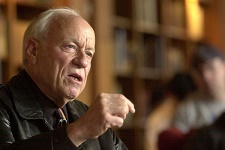
Leon Litwack
Professor of History, Emeritus
Leon Frank Litwack (1929-2021) contributed immeasurably to the department’s stellar reputation. In his forty-three years here, he taught over 35,000 undergraduates in his legendary course on the U.S. from the Civil War to the Present (History 7B). A masterful lecturer, Litwack offered a riveting understanding of the nation’s recent past, from the ground up, centering the experiences of those typically excluded: especially Blacks; workers and unions; women; the poor and dispossessed; radicals and dissidents. Litwack offered a perceptive and critical view of our nation’s past as the best way not only to understand that past, but also to understand the connections across the nation’s past, present, and future.
A Guggenheim Fellow, former President of the Organization of American Historians, and member of the American Academy of Arts and Sciences, Litwack was “a scholar’s scholar.” His extraordinary body of work is at once trailblazing, insightful, highly readable, and deeply influential. North of Slavery: The Negro in the Free States, 1790-1860, is a pathbreaking study that perceptively probed the antebellum tension between black freedom struggle and northern-style anti-black racism. Been in the Storm So Long: The Aftermath of Slavery (1979) — a magisterial exploration of black emancipation during the Civil War and Reconstruction —is his best received and best-known work. It was awarded the Pulitzer Prize, National Book Award, and Francis Parkman Prize. Trouble in Mind: Black Southerners in the Age of Jim Crow (1998) is a complex and compelling examination of “freedom’s first generation” in the “heart of darkness” of Jim Crow. How Free is Free: The Long Death of Jim Crow (2009) is an astute series of essays on the early Modern Black Freedom Struggle. In an unfinished work, Litwack was grappling with the role of black activism during World War II in shaping the Modern Black Freedom Insurgency.
Litwack trained several dozen graduate students, many with noteworthy careers within and outside the academy. Leon and Rhoda, his amazing wife of sixty-nine years, often spoke affectionately of their extended “academic family,” especially their former graduate students. To be a part of that “academic family” is both an honor and a joy.
Leon — the only son of Minnie, a seamstress, and Julius Litwack, a gardener — came of age in a largely Mexican-American, working class community in Santa Barbara. As a Berkeley undergraduate (1947-1951) and graduate student (M.A. 1952: Ph.D. 1958), he battled the Red Scare orthodoxy and modeled activism in a time of conformity. After a short stint teaching at the University of Wisconsin, Litwack returned to his beloved Berkeley in the fall of 1964, during the Free Speech Movement. As he often observed:
“When I hear UC Berkeley denounced for lawlessness, debauchery, free thinking, subversion, harboring communists and radicals, exposing students to radical ideas — whenever I hear those charges made, that’s when you’ll hear me, wherever I am, shout: Go Bears!”
Litwack is survived by Rhoda; his son John and daughter-in-law Nadia; daughter Ann; grandson Evan; and granddaughter Reva and grand-son-in-law Jonathan.
Waldo E. Martin
2021
Photo credit: Noah Berger
